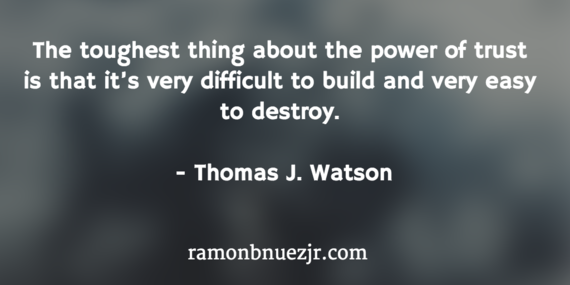How important do you think being a good navigator is for a leader? I would say, very important because it’s a core component of efficient leadership.
Unfortunately, being a good navigator is not an inborn skill. It must be developed through past experiences of success and failure, not to mention a solid supporting cast:
- Clarity in your destination.
- Being able to envision your entire journey.
- Profound understanding of all possible obstacles.
- A self-awareness of your weaknesses so you can build a team that complements those deficiencies.
A leader is one who sees more than others see, who sees farther than others see, and sees before others do." - Leroy Eims, author of Be the Leader You Were Meant to Be
Why is Trust a Crucial Piece of the Puzzle
Without a solid command of navigation, you are destined to lead your team to failure, and the trust your people have placed in you will begin to suffer. As their trust decays so goes the influence over your team.
Jeff Walpole CEO of Phase2, explains, "Building trust is perhaps the most important and often most difficult aspect of leadership because smart people are hard wired to question - and you need smart people to help you lead the rest."
My navigation was tested when I implemented an automation software project for a former employer. I knew that senior management was taking a particular interest in this project, so I took complete control. I developed the plan. I secured the resources and funding. I chose the team members and told them this project is the top priority.
I stood proudly as my vision was about to be executed when disaster struck. Almost immediately each team member resisted the implementation of my plan. My automatic response was for them to get over it. Why? Because none of my decisions were wrong, everything I did needed to be done:
- I took charge because it was an extremely visible project.
- I developed a plan based on feedback from upper management.
- I secured the necessary funding and resources so there would be no sudden surprises.
My failure was in the way I went about making those decisions - without my team. I purposely bypassed them, dropped the project in their laps and commanded them to get this high priority project done, now! The team was confused and offended because this is not how I manage projects.
When we take on new projects, I gather everyone, speak to other experts, get an understanding of resource availability and requirements, and then set my team loose. I tried to take a short-cut, and it was a bad move. And because of my poor decisions, the trust I had built was tarnished.
"The toughest thing about the power of trust is that it's very difficult to build and very easy to destroy." - Thomas J. Watson, CEO of IBM
As soon as I realized my mistake, I apologized to my team for my lack of leadership. I have also come to realize that your people know when you make mistakes. And as a good leader, it's your responsibility to apologize and rebuild the trust you have lost.
9 Steps to Overcome Major Barriers
I scheduled time for reflective thinking. I needed to reflect on my positive and negative experiences during this leadership. I realized that I needed a better system, and I found a strategy that John C. Maxwell, author of The 21 Irrefutable Laws of Leadership, uses:
- Predetermine a course of action
- Lay out your goals
- Adjust your priorities
- Notify key personnel
- Allow time for acceptance
- Head into action
- Expect problems
- Always point to the success
- Daily review your plan
This strategy became my blueprint that I use in my leadership. It allows me to make a careful and critical examination of my vision. But more importantly, it forces me to become a better navigator.
“Major barriers to successful planning are fear of change, ignorance, uncertainty about the future, and lack of imagination.” -John C. Maxwell
Being a good leader is a lifelong endeavor. By examining my laundry list of failures, I found that preparation is the secret of good navigation. So the next time you have a leadership decision prep it through Maxwell's strategy.
If you take the appropriate energy to prepare for your leadership, you will not only feel confident in your vision, but your team will trust you to lead them. If you don’t take the time to prepare, you will be uncertain about your vision and your team will lose faith in your leadership.
So it’s up to you to decide what type of navigator to become.
Visit ramonbnuezjr.com for more content like this + to sign up for my newsletter and receive a free copy of my e-book "The Ultimate Guide To Living On Purpose," about how to live your life on purpose.

